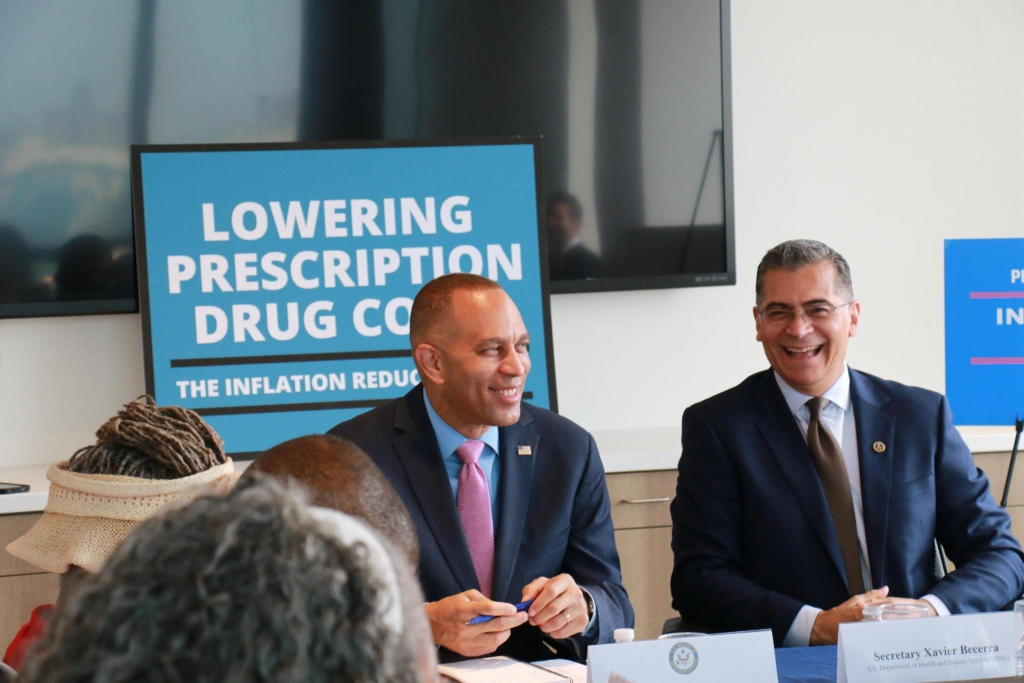Central to who we are is the belief that no one in America should struggle to afford the medication and health care they require. Unfortunately, far too many seniors have had to choose between their medicine cabinet and kitchen table. That’s why House Democrats took on Big Pharma in the 117th Congress and passed historic legislation to lower prescription drug costs for the American people.

Under the leadership of President Biden and in response to the overwhelming desire from Americans across the country to make prescription drugs more affordable, Democrats took decisive action.
In 2021, House Democrats introduced the Inflation Reduction Act, landmark legislation that aims to reduce inflation, curb the federal budget deficit, reduce prescription drug costs and invest in domestic clean energy. This monumental bill was passed by the 117th United States Congress and signed by President Biden in 2022. With the Inflation Reduction Act signed into law, we stood up to Big Pharma, and we will continue to fight for high-quality and affordable healthcare for every American.
The Inflation Reduction Act Helps Medicare Beneficiaries by:
- Capping out-of-pocket costs for prescription drugs at $2,000 annually
- Capping out-of-pocket costs for insulin products at $35/month
- Making vaccines, including for the flu and for shingles, free for seniors
- Empowering Medicare to negotiate pricing for prescription drugs over the next decade
- Preventing egregious price gouging by requiring drug companies to pay a rebate for price increases above inflation
- Lowering health insurance premiums by extending enhanced $800 subsidies for the 13 million Americans who get their coverage under the Affordable Care Act
Thanks to Democrats and President Biden’s efforts, millions of Americans won’t have to make a decision between accessing life-saving medical care and putting food on the table. For a senior couple making $70,00 per year, they will see savings of over $8,800 on average per year because of the Inflation Reduction Act. These monumental reductions to American’s health care costs were accomplished alongside dramatic deficit reductions and fully paid-for by tax reforms for the largest corporations and ultra-wealthy, building a leveled economy that works for all Americans and grows from the bottom up and middle out.
How the Inflation Reduction Act Might Affect You:
- Out-of-pocket costs for insulin are capped to $35 a month as of January 1, 2023 for insulin covered under Medicare Part D and July 1, 2023 for insulin covered under Medicare Part B.
- Adult vaccines covered under Part D and recommended by the Advisory Committee on Immunization Practices, such as for shingles, are covered at no cost as of January 1, 2023.
- Beginning in 2024, out-of-pocket costs for prescription drugs under Part D will be capped at $3,250 annually and further capped at $2,000 in 2025.
- Beginning in 2026, the Secretary of Health and Human Services will negotiate prices with drug companies for single-source brand-name drugs and biopharmaceuticals selected from among the 50 drugs with the highest total spending from Part B and Part D. The number of drugs subject to price negotiation will be 10 Part D drugs for 2026, 25 Part D drugs for 2027, 40 Part D and 15 Part B drugs for 2028 and 60 Part D and 35 Part B drugs for 2029 and beyond.
- Drug manufacturers must rebates back to the federal government if prices for single-source drugs and biopharmaceuticals covered under Part B and nearly all drugs covered under Part D increase faster than the rate of inflation. These rebates counteract drug price gouging and will be deposited back in the Medicare Supplementary Medical Insurance fund.
- The legislation also extends the American Rescue Plan’s $800 premium subsidies to 2025 from its original expiration date on January 1, 2023.
To learn more, please visit: